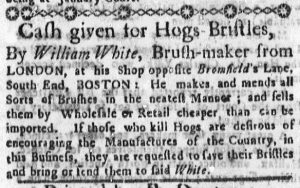What was advertised in a colonial American newspaper 250 years ago this week?

“Desirous of encouraging the Manufactures of the Country.”
During the imperial crisis that led to the American Revolution colonists resisted Parliamentary overreach with several non-importation and non-consumption agreements, each coinciding with particular legislative acts. The first round occurred in response to the Stamp Act, ceasing with the repeal of that hated measure. Colonists once again resorted to non-importation and non-consumption of British goods in response to the Townshend Acts, scheduled to take effect on November 20, 1767.
Throughout the last third of the eighteenth century, as colonists moved from resistance to revolution to independence, American advertisers developed marketing appeals that encouraged consumers to “Buy American.” Over time advertisers became much more explicit in their efforts linking consumption to political participation. A notice that appeared in the Massachusetts Gazette five weeks before the Townshend Acts took effect shows an early attempt. William White, a “Brush-maker from LONDON,” did not mention Parliament or the impending legislation, but readers would have made the connection on their own thanks to news items and opinion pieces elsewhere in Boston’s newspapers as well as conversations taking place throughout the city and beyond.
White encouraged potential customers to support domestic production rather than purchase imported wares. He noted that he made and sold brushes “Wholesale or Retail cheaper than can be imported,” prompting consumers to think about the origins of all the goods they acquired, not just the brushes they purchased from him. He also implicitly issued a challenge to retailers to acquire and distribute locally produced goods: presumably those who purchased brushes “Wholesale” did so with the intention of selling them in their own shops.
White framed his comments about the cost of his brushes with a statement even more overtly political. He made an appeal to colonists who were “desirous of encouraging the Manufactures of the Country” rather than continued importation of goods from England. Here he addressed colonists who could supply him with the bristles he needed to make “all Sorts of Brushes.” Not just consumers but producers as well had a duty to support local production over importation. In addition, even though White described his potential suppliers as “desirous of encouraging the Manufacturers of the Country” he implied that consumers should adopt the same attitude and opt to purchase their brushes from him.
William White did not invoke Parliament or the Townshend Acts by name in his advertisement, but contemporary politics still influenced how he structured his appeal to potential customers and how colonists interpreted his advertisement. He did not need to make his case any more explicitly because his advertisement was part of an ongoing conversation – in print and in person – among residents of Boston and throughout the colonies.
